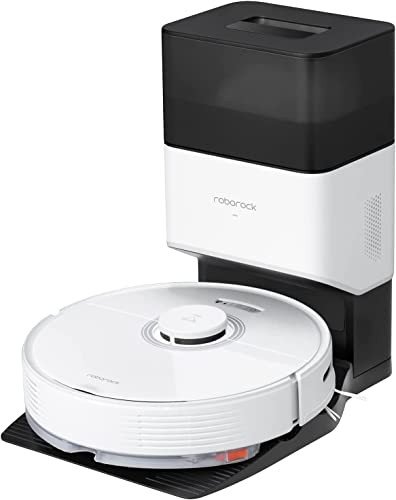Robot Vacuum Cleaners: The Future of Home Cleaning
In today's hectic world, where time typically comes at a premium, robot vacuum cleaners have actually become a game-changer in household upkeep. Created to automate the tiresome job of vacuuming, these home appliances continue to acquire popularity amongst property owners seeking benefit and efficiency. This article explores the numerous elements of robot vacuum cleaners, highlighting their features, advantages, and the elements to consider before purchasing one.
What is a Robot Vacuum Cleaner?
Robot vacuum are autonomous gadgets that navigate throughout the home, using sensing units and navigation innovations to tidy floorings while decreasing human intervention. Unlike conventional vacuum cleaners, robot vacuums are developed to run independently, returning to their charging station when they require to dock and recharge. The combination of clever innovation also allows these devices to be managed through mobile phone applications or wise home systems.
Functions of Robot Vacuum Cleaners
The abilities of robot vacuum cleaners have expanded considerably throughout the years. Here are some typical features discovered in modern models:
- Suction Power: Varies amongst designs, with some providing high suction for deep cleaning carpets.
- Navigation Technology:
- Lidar (Light Detection and Ranging)
- Camera-based navigation
- Gyroscope sensors
- Smart Home Integration: Compatible with virtual assistants like Amazon Alexa and Google Assistant.
- Arranged Cleaning: Allows users to set specific times for the vacuum to run autonomously.
- Self-Emptying Dust Bins: Some models come with a base that instantly empties the gadget's dustbin.
- Multi-Surface Capability: Suitable for both carpets and tough floors.
- Anti-Tangle Design: Brushes that reduce tangling with hair or strings.
- Virtual Boundaries: Users can set barriers so that the robot prevents certain areas or rooms.
Advantages of Using Robot Vacuum Cleaners
The popularity of robot vacuum can be attributed to several essential advantages:
- Time-Saving: Automating the vacuuming process frees up valuable time.
- Efficient Cleaning: Many robot vacuums can reach under furnishings where conventional vacuums might have a hard time.
- Consistency: Robot vacuums can be set to clean regularly, guaranteeing that areas are preserved without much effort.
- Smart Features: The ability to arrange cleansings or manage the device through an app improves user benefit.
- Flexibility: Most designs are capable of changing cleaning techniques based upon the surface area type.
Considerations When Choosing a Robot Vacuum Cleaner
Despite their many benefits, possible purchasers must think about a number of aspects to ensure they select the right robot vacuum for their requirements:
- Home Size and Layout: Larger homes might require designs with effective batteries and advanced navigation.
- Kind of Flooring: Some models perform much better on carpets, while others excel on hard floorings.
- Animals: Homeowners with pets need to search for designs developed to deal with animal hair and dander.
- Budget: Robot vacuums range extensively in rate, from budget plan models to high-end devices with advanced features.
- Maintenance: Consider the cost of changing filters and brushes, and the ease of cleaning the gadget itself.
- Noise Level: Some models operate silently while others can be disruptive during cleaning cycles.
Popular Robot Vacuum Models
To aid possible buyers, the following table details some popular robot vacuum designs together with their key features and rate varieties:
| Model | Suction Power | Navigation Type | Smart Home Compatible | Typical Price |
|---|---|---|---|---|
| iRobot Roomba i7+ | High | Lidar + Camera | Yes | ₤ 799 |
| Roborock S7 | Moderate | Lidar | Yes | ₤ 649 |
| Neato D7 Overview | High | Laser Navigation | Yes | ₤ 649 |
| Eufy RoboVac 11S | Moderate | Basic Sensors | No | ₤ 239 |
| Shark IQ Robot | Moderate | Electronic camera + Sensors | Yes | ₤ 499 |
Frequently Asked Questions (FAQs)
1. Can robot vacuum clean up all kinds of surfaces?Yes, the majority of modern-day robot vacuum are designed to work on a range of surfaces, consisting of carpets, tile, and hardwood floors. However, it is recommended to inspect the specs of individual designs as some may be much better matched for specific surfaces.
2. How long does a robot vacuum operate on a single charge?The battery life of robot vacuum cleaners differs by model, generally lasting anywhere from 60 to 120 minutes. Larger homes with more square video footage may need models with extended battery life.
3. Do robot vacuum cleaners need a great deal of upkeep?Maintenance requirements depend on the design, however the majority of need occasional emptying of the dustbin, cleaning of brushes, and replacement of filters. Some models feature self-emptying bases that decrease maintenance.
4. Are robot vacuums effective at picking up animal hair?Numerous robot vacuums include specialized brushes and powerful suction designed specifically for pet hair. Those especially fit for family pet owners can effectively manage hair and dander.
5. Can robot vacuum cleaners map my home?Lots of sophisticated designs come geared up with mapping innovation, allowing them to develop a layout of your home for more efficient cleaning. This function can also make it possible for users to set virtual boundaries.
As innovation continues to progress, robot vacuum are expected to end up being even more advanced, providing improved cleaning capabilities and clever functions. Danille Katon function as valuable tools for anybody seeking to keep a tidy home with minimal effort. By comprehending the numerous features, benefits, and considerations connected with picking a robot vacuum cleaner, consumers can make educated decisions to discover the very best fit for their cleaning needs. Welcoming this technology not just simplifies home tasks but likewise paves the way for a cleaner, more arranged living area.

